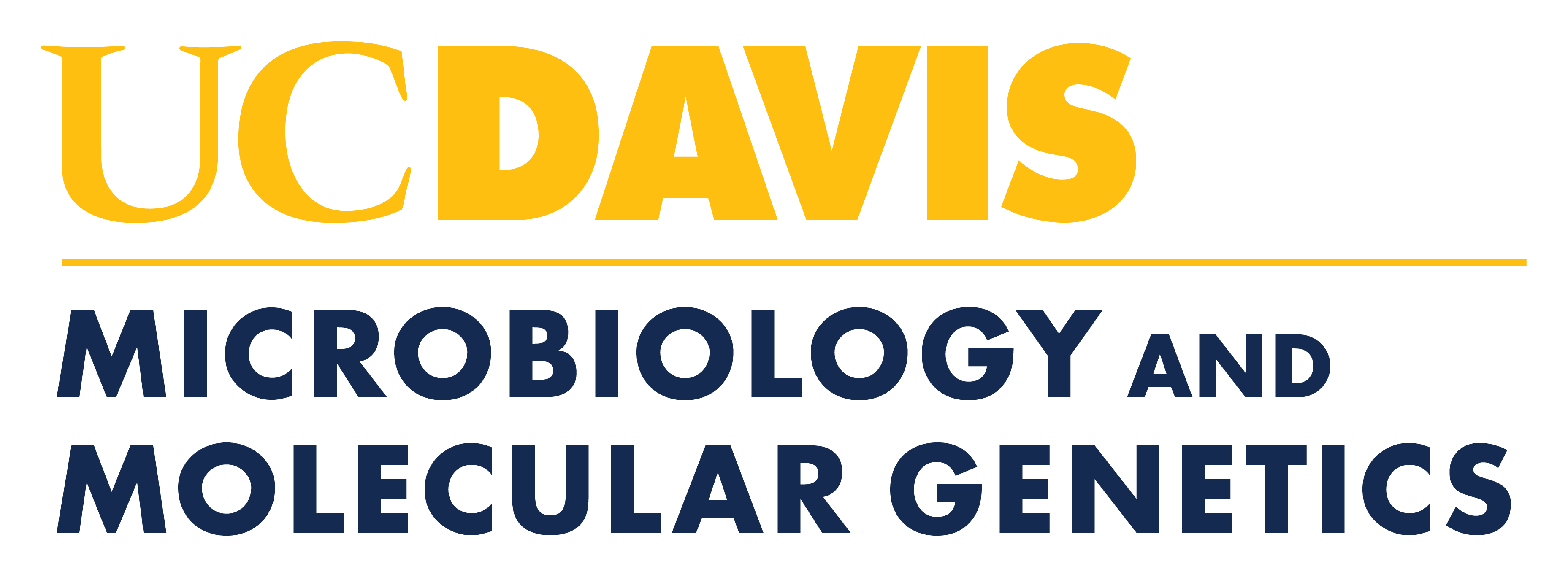Announcements
- Forms for research credit in Fall Quarter 2025 (MMG-099, MMG-199, MIC-190C)
- Summer Session courses are listed on our courses page.
"We cannot fathom the marvelous complexity of an organic being; but on the hypothesis here advanced this complexity is much increased. Each living creature must be looked at as a microcosm – a little universe, formed of a host of self-propagating organisms, inconceivably minute and as numerous as the stars in heaven." —Charles Darwin
What can I do with a degree in microbiology?
Graduates with degrees in microbiology have a wide spectrum of career opportunities, in industry, government, and hospitals. A degree in microbiology also prepares students for a postgraduate education in allied health programs and for graduate school leading to advanced degrees and employment in a wide range of health- and science-related careers. In addition, microbiology graduates are well prepared for entering professional schools, such as Medical or Dental schools, or continuing with graduate education at the Ph.D. level. To help students with such decisions, there are a wide variety of internships available, via the campus Career Center.
Jobs related to a degree in microbiology include:
- Biomedical scientist
- Clinical laboratory scientist
- Food technologist
- Healthcare scientist, immunologist
- Nanotechnologist
- Pharmacologist
Our campus provides an information page for the Microbiology Major, which includes real world outcomes and requirements.
"If you want to be an anthropologist, you need to study physical anthropology specialized in bones. If you want to be a forensic chemist, get a degree in chemistry. Do you want to do DNA work? Get a degree in microbiology. And do well. Study hard and go to graduate school." —Kathy Reichs, author and forensic anthropologist
The Microbiology Program and Major
You'll begin your study with foundation courses in biological sciences, chemistry, mathematics, and physics. At the upper-division level, you'll study advanced general topics in the biological sciences, including microbial diversity, molecular microbiology, virology, and immunology. You may choose to pursue an A.B. degree, giving you greater opportunity to choose courses outside your major, or a B.S. degree, providing more rigorous training in the biological sciences.
Program Learning Outcomes
- Communicate scientific data and ideas related to the field of microbiology in oral, written, and/or visual formats to scientists and the public.
- Explain how microbes at the organismal or cellular level, interact with animals, plants, other microbes, and the environment in beneficial, neutral, and detrimental ways.
- At a molecular level, use genetics and biochemistry to explain cellular functions and how these functions support the activities of individual microorganisms in their natural environment.
- Explain the mechanisms and environmental factors that lead to diverse organisms over evolutionary time
- Identify, explain, and use standard practices in a microbiology laboratory setting to address a scientific question.
- Generate and analyze data to test a hypothesis in the field of microbiology using quantitative and qualitative methods.
[The PLOs above are for the Molecular and Medical Microbiology (MMM) major.
The PLOs for the Microbiology (MIC) major can be found at assessment.ucdavis.edu.]
Requirements
The Microbiology Undergraduate Program offers Bachelor of Science (B.S.) and Bachelor of Arts (A.B.) degrees in the College of Biological Sciences. Both degrees are designed to provide students with quantitative skills and knowledge across the breadth of Biological Sciences, while maintaining a focus on the biology of microorganisms. The B.S. degree offers more training in mathematics, biochemistry, and laboratory methodology; the B.A. degree incorporates more exposure to the liberal arts. The Microbiology major has a strong laboratory component, with students taking two microbiology laboratory courses: MIC-104L and our capstone MIC-105L labs. Like all lab courses in the College of Biological Sciences, there is a small course materials & services fee. The choice of a major program and its suitability for particular career options should be discussed with a major advisor.
Advising
Advisors for the Microbiology Major are provided by the Biology Academic Success Center (BASC), located on the ground floor of the Esau Science Hall. The BASC offers academic advising by scheduled appointment or drop-in hours, as well as peer-advising by Microbiology majors with Senior standing. Academic advisors help students with schedule planning for their degrees, career planning, as well as providing information to help students navigate the various administrative and academic issues that may arise.
Other Opportunities while at UC Davis
The Microbiology program and faculty offer students a variety of additional opportunities to enrich their academic experiences. These include various Study Abroad courses, engagement in the undergraduate American Society for Microbiology (ASM) club, as well as opportunities to engage in faculty laboratories through our introduction to research (MIC-091/191), internship (MIC-192), honors research (MIC-194H), and special study for advanced undergraduates (MIC-099/199) programs.
UC Davis General Catalog Courses: MIC (Microbiology), MMG (Microbiology & Molecular Genetics)
College of Biological Sciences Undergraduate Education
UC Davis Undergraduate Education & Undergraduate Research Center

